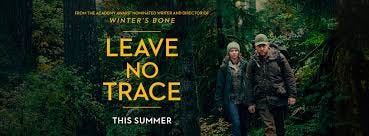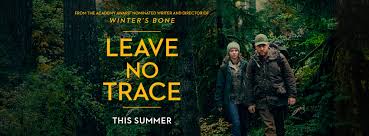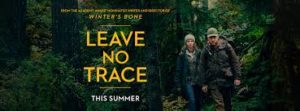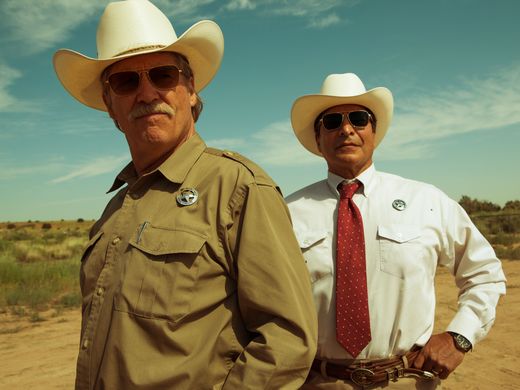Interview: Ben Foster on “Leave No Trace”
Posted on July 7, 2018 at 7:27 pm
Ben Foster stars in Debra Granik’s new film, “Leave No Trace,” as a veteran with PTSD who lives in a public park with his daughter. It is based on Peter Rock’s novel My Abandonment, which itself inspired by a news story reporting that a father and daughter were living off the grid but in plain sight. Writer/director Debra Granik (“Winter’s Bone”) adapted the story in a quiet wonder of a film co-starring newcomer Thomasin Harcourt McKenzie. I spoke to Ben Foster about preparing for the role and what it meant to him as a new father himself.

The opening scene has almost no dialogue as the characters get ready for the day by making breakfast and taking care of the campsite. There is such a believably capable and coordinated routine between you and Thomasin. How do you achieve that sense of having done it a million times?
I suppose that’s the big question. You try to personally at least spend as much time training in whatever tasks or whatever tools are necessary to the film in order to not have to think about it when we’re shooting.
I had a two-week extensive training camp in the Pacific Northwest on wilderness appreciation and survivalism, from building shelters to building fires to what kind of fire pits to make — we had a Dakota pit because we took a military aspect. This is a kind of fire pit that has a low smoke profile. I did the homework and then I brought that to Debra and then Debra integrated what sparked her. And then she and I went through the script and red-lined it and got rid of about forty percent of the dialogue. Once we realized that it is the physical actions that speak for Will, that was a great joy of the film. The way that he would choose his belongings was the way that he would choose his words. Very spare.
What were some of the things that you learned in your wilderness training that surprised you?
What surprised me was how blind I was to a forest environment, I’ve been drawn to the Pacific Northwest for years but through the training I learned it’s a language; learning the language of the forest, learning how to read tracks, learning how to cover up your own tracks, learning how to find resources where ordinarily it would look like an emergency. I learned that one can create a shelter or find food and water and that kind of appreciation has given me a confidence that I’ll take with me for the rest of my days. It’s not hard to learn, anyone can take a weekend course to feel a little bit more prepared if they get in a pinch. It’s a mental and emotional security to know how to take care of yourself and your own in whatever environment you find yourself in.
We don’t learn many details about your character’s life and what made him decide this was the best way to raise his daughter.
The script is beautiful. Once I got involved in the training and we were sharing stories of people that we’d met along the way, friends of mine who have served, who have talked with me candidly about their experience of returning and Debra’s experiences with documentaries — it’s just like that line in the script: Is it a want or a need?
That was my door into the role. I came to Debra and said, “I think we can get away with saying a lot less here,” and it became a wonderful experience of telling rather than saying.
You started acting very young. How did that help you work with Thomasin?
I didn’t need to help her. She came in poised, she had done her homework, and she was a joy beginning to end to work with. She was she was a very present, beautiful actor. Sometimes you’ve got to work a lot harder at it than others to cope with a believable relationship. With Thom it was immediate and I imagine audiences will feel the same way when they watch her. She has something rare.
I felt that the story was really just a very heightened version of what all parents go through. We all try to create in our own way a controlled environment around our children and protect them in whatever way we think we can and they all grow up and say, “I’m going to live my own life and I have my own choices to make.” Do you think that’s right?
I do. I was expecting the birth of our first child while we were shooting so these questions were very loud in my mind and my heart and will continue to be. Since the birth of our daughter I have apologized more to my parents and I’ve apologized to anyone in my life -“I’m so sorry and thank you, thank you, thank you.”
It’s such a troubling time right now and particularly for families. I hope when people see this film they call the one they love or even better yet if they are near you, squeeze them. It goes fast and we can get so distracted in our lives with technology and we can get distracted with the darkness in the world. But I hope this film reminds people that there are good people out there. There aren’t necessarily just villains running the world, there are good people on every corner in this world not just America but in the world and it’s important that we take the time to acknowledge them and love the people closest to us.
You have often gravitated toward playing military characters. Is that something that specially resonates with you?
The desert wars are my generation’s wars and in terms of drama and narrative they continue and are still affecting so many lives. I’m just naturally impressed and inspired by anybody who is in the service; anybody who decides to do for others. Whatever your reasons for getting into and continuing to be in service, not just military, I’m just drawn to that kind of dedication and giving. I’ll cry just thinking about it.




